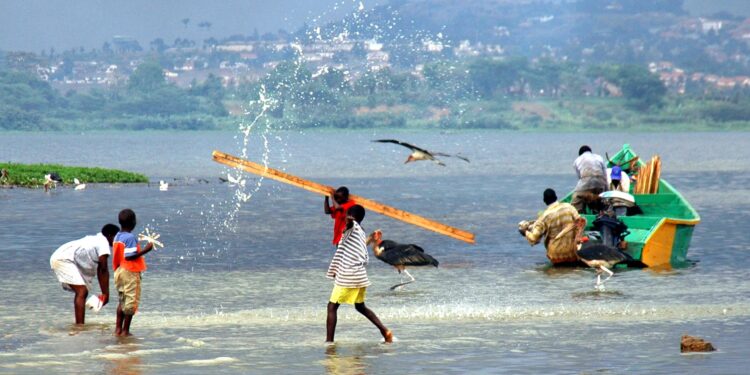Officials from the Ugandan Ministry of Agriculture and the Fisheries Protection Unit have confirmed the detention of Kenyan trucks transporting fish and the arrest of their drivers near the border of the town of Mpondwe, a few kilometers from the Democratic Republic of the Congo.
Kenyan fish traders operating in Busia town export the fish to eastern parts of the Democratic Republic of the Congo along the Ugandan border, before being exported to major cities, such as Kisangani and Goma.
Ugandan Ministry of Agriculture spokesman Lubin Ndevula said the seizure of Kenyan fish shipments came after they received reports that immature fish from Uganda were smuggled into Kenya across the porous border and were transported to the Democratic Republic of the Congo as fish from Kenya.
According to the Uganda Fisheries and Aquaculture Act 2022, fishermen are not allowed to catch Nile fish that are less than 50 cm in length and are considered immature, unlike in Kenya and Tanzania where catching and trading immature fish is not illegal.
Anger in Kenya
The decision has angered Kenyan fish exporters, whose leader Margaret Wafula has accused Ugandan neighbors of constant harassment and violation of EAC bilateral trade agreements. She added in a statement to the African Report newspaper, “I obtained a loan from the bank to transport fish to the Democratic Republic of the Congo. Who will pay for these losses?”, calling on the Kenyan government to intervene to end the crisis.
The head of the Busia District Beach Management Unit in Kenya, Sylvester Kayiwa, denies allegations of immature fish being smuggled from Uganda. Instead, he accuses Ugandan authorities of ignoring the 2022 agreement signed at the Busia border, which stipulates that Uganda will not prevent fish trucks coming from Kenya from crossing into the Democratic Republic of the Congo.
“These are our fish. We are only using their country as a transit route. Our trucks and drivers must be released,” he added. Kayiwa wants the Kenyan government to protect Kenyan fishermen trying to access the market in the Democratic Republic of the Congo, a new member of the East African Community.
Kenyan fish tanker drivers have accused Ugandan authorities of forcing them to pay a bribe or face charges and heavy fines, even though they held export permits from border posts, an allegation denied by the Ugandan army.
In March 2022, Uganda agreed to compensate Kenyan fish exporters for the confiscation of their catch destined for the Democratic Republic of the Congo, on October 1, 2021 at the Mpondwe border in Kasese district in Uganda. Kenyan fish farmers claimed that Ugandan officials confiscated fish worth more than $400,000.
The latest dispute comes a month after Ugandan President Yoweri Museveni visited Nairobi, where he signed agreements with his Kenyan counterpart, William Ruto, to end all trade disputes and ordered commercial operations to return to normal between the two neighboring countries.
According to a Kenya Bureau of Statistics report issued in January, Uganda remains Kenya’s largest trading partner in the region despite trade disputes that have threatened the economies of both countries.
In 2023, Kenya and Uganda announced a joint committee to educate fishermen from both sides on the laws regulating fishing and help end illegal and immature fishing in Lake Victoria.
The need for a common protocol
The EAC partner countries have a similar protocol, regarding fishing net standards, however, each country has its own laws governing fishing methods, which remains a challenge for fishermen who catch fish from both sides.
In this context, Kenneth Lukwago, a political and social issues analyst based in Kampala, told the African Report newspaper that trade disputes related to fish will continue for a long time unless the East African Community countries decide to establish common guidelines on fishing.
“EAC member states need to harmonize fishing laws. This ongoing dispute over immature fish is a symptom of larger underlying issues that are not being addressed,” Lukwago adds, noting that the dispute between Kenya and Uganda shows that trade disputes have not been fully addressed. Despite Museveni’s meeting with Ruto.
Uganda, which controls 45% of Lake Victoria, has deployed the army to guard its territorial waters, as experts warn that catching immature fish will significantly reduce fish numbers in Africa’s largest freshwater lake.



